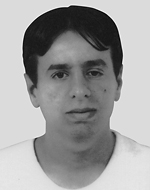Son of Nezemia and Yusuf. He was born on 28 November 1985 in Ar’ara, in Wadi Ara. Ahmad, Angham, Hisham, and Walid. Said is a member of a Muslim family. He studied and was educated in the school in Arara. He was a boy full of joy. From an early age, Said’s father worked in the center of the country with Jews, and established good relations with them. Following the events of October 2000 in Wadi Ara, the father, Yusuf Muhammad Jahja, concluded that the Arabs in Israel should volunteer for military service. He sent his sons to the IDF to change the prejudice of Israeli Jews towards Wadi Ara and to convey a message to the Israeli public: All the boys should serve in the country they live in and protect. Yusuf Jahja returned from work on the day the riots broke out and he was shocked to see that a burning Egged bus, traffic lights on the road, burning tires and stones on the road and on sidewalks were burning in the village. “For me it was a black day for the state, The Arab residents and the Wadi Ara area, “he said, adding that 80 percent of the Arab residents of Wadi Ara were seeking nothing more The Arab minority in Israel can serve as a bridge to peace in the political sphere Since the riots, he has been thinking about how to improve the image of Wadi Ara among the Jewish population, Shared his doubts with family and friends, and finally reached the unequivocal conclusion that in order to clear the stain on the Arab population in the area, the boys had to volunteer for the civil service, and Said’s twin brother, Walid, volunteered for the 585 Battalion (Bedouin Desert Patrol Battalion) -Hisham, volunteered for the Border Police. Said wanted very much to join the army and follow his twin brother who had already served at the Rafah outpost, a few hundred meters east of the Rafah terminal. However, dozens of young Arab Muslims from the villages of the Triangle followed the Jahja family and volunteered to help them, Sayid enlisted in the IDF on December 29, 2003, and underwent basic training and advanced training in the infantry unit of the 585th Battalion. After that he was posted as a combat soldier at the JVT post in Rafah, where he replaced his brother and took his place. Who loved his military service and was not afraid to serve in the territories On December 12, 2004, at 6 PM, an explosion occurred in the eastern part of the outpost. Two explosive explosions, one at a time, in two different locations, caused the injury of all eleven soldiers who were in the post at the time, and two terrorists who were ambushed immediately entered the outpost They then returned fire and killed one of the terrorists, while his friend managed to escape, and rescue forces were dispatched to the area to rescue the wounded. Due to the massive fire of mortar shells that opened from several directions, IDF forces managed to rescue the wounded only after a long time, in which five soldiers and Sayid were killed and six wounded. Arif Azaberga, Sergeant Tariq al-Ziadneh and Sergeant Hussein Abu Lil, Sa’id Jahja fell in operational activity in Gaza on December 12, 2004, and the following day he was brought at a military ceremony for eternal rest inThe cemetery in his village of Arara. He was nineteen when he fell. He was survived by his parents, five brothers – Ihab, Muhammad, Ahmad, Hisham and Walid, and two sisters – Ruzit and Angham. After his death Sa’id was promoted to sergeant. After Sayid’s death, his twin brother said that the family usually spoke with Sayid after 11 PM. Because by morning they could not get him, they felt that something bad had happened to him. At that time, IDF representatives came to the house and told them that their son had been killed, and a large crowd followed Sa’id’s coffin and gave him the last honor, and then the prime minister, ministers and many others came to Ar’ara to comfort the family. To the east, the “Ohel Said” memorial site was erected, a covered building facing the village of Arara – a landscape of dense Arab settlements, mainly Jewish agricultural settlements, and on the western Mount Carmel that extends to the sea. To Muslims who fell in the tunnel disaster in Rafah in 2004. ” At the entrance to the commemoration room, the names of the Arab soldiers who fell in Rafah are engraved in Hebrew and Arabic, and on the wall behind is the Israeli flag. On the gravestone next to the monument were engraved the words: “Do not cry mother, do not cry Father, Ohel Said – equality and peace.” In addition, Sayid is commemorated at the memorial site for Muslim and Christian soldiers in the village of Arara.
